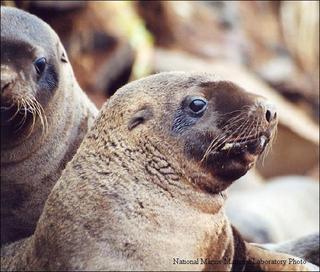Western Aleutian Fishing Restrictions Survive Court of Appeals

Wednesday, July 24 2013
The Ninth Circuit Court of Appeals has upheld restrictions on fishing in the western Aleutians to protect an endangered stock of Steller sea lions.
Environmental groups hope the ruling will convince the federal government to change their management strategies, while industry is concerned that it doesn't bode well for the future. KUCB’s Stephanie Joyce reports.
Oceana was one of several environmental groups that supported the National Marine Fisheries Service in the case. Jon Warrenchuck is the organization’s senior scientist. He says the Ninth Circuit’s ruling sends a message to fisheries managers -- that they need to take a holistic approach when endangered species are involved.
“Not just looking at how much fish can we pull out of the ocean, but what is an optimum level of prey for Steller sea lions, and how can we really work the commercial fisheries around those levels.”
The actual court opinion is a lot narrower than that. The Ninth Circuit ruled that contrary to the plaintiffs’ arguments, the federal government doesn’t need to prove a direct correlation between fishing and sea lion population decline in order to impose restrictions on fishing activity. The judges said it was enough to show that fishing targeted the same species that Steller sea lions eat, and that simultaneously, the sea lions were nutritionally stressed.
Linda Larson, the attorney who argued the case on behalf of the State of Alaska and industry groups, says that leaves the door open for lazy science.
“What they're saying is ‘you don't really have to have that connection between cause and effect.’”
Colin O’Brien argued the case for environmental groups supporting the federal government. He doesn’t agree that NMFS failed to prove a connection, but says in the end, the most important thing is whether the agency was abiding by the Endangered Species Act:
“In the key section of the ESA, [it] says an agency must ensure that federal actions will not jeopardize an endangered species. The word is ensure. That’s a powerful word that requires agencies to be thoughtful and careful and to give endangered species the benefit of the doubt.”
NMFS is far from done with this management issue, though. As part of their ruling, the Ninth Circuit upheld a lower court mandate that the agency evaluate the environmental and economic impact of the fishing closures. That process is already underway, and probably will result in changes to the way the western Aleutians are managed.
If there are changes, they’ll trigger a reconsideration of the science behind the current management strategy -- the original goal of the fishing industry’s lawsuit. But if this most recent court battle is any indication, that may just be the beginning of another round of legal sparring over Steller sea lions.




noone on Sunday, July 28 2013:
Are u serious .. sea lions over supporting living families u got to be ... Leave it to the courts like your comment and yes Dutch harbor is and will be next Adak in few years .. bet on it
Leave it to the Courts on Wednesday, July 24 2013:
Upside to fishing closures:
The City wont need to worry about fixing their million dollar exotic Wartsilla diesel engines with technicians flown in from Finland...no one will be here to use the electricity
Workers with pensions from the City wont get paid - city will go bankrupt....
No more complaining about high PennAir flight costs to Dutch, as it will be a ghost town
Thank you Steller Sea Lion - now you can grow an grow and eat all the remaining Sea Otters - woops - then they will be endangered...what to do when one endangered species is eating another - Leave it to the Courts